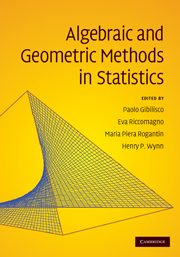Book contents
- Frontmatter
- Contents
- List of contributors
- Preface
- Frequently used notations and symbols
- 1 Algebraic and geometric methods in statistics
- Part I Contingency tables
- Part II Designed experiments
- Part III Information geometry
- 14 Introduction to non-parametric estimation
- 15 The Banach manifold of quantum states
- 16 On quantum information manifolds
- 17 Axiomatic geometries for text documents
- 18 Exponential manifold by reproducing kernel Hilbert spaces
- 19 Geometry of extended exponential models
- 20 Quantum statistics and measures of quantum information
- Part IV Information geometry and algebraic statistics
- Part V On-line supplements
18 - Exponential manifold by reproducing kernel Hilbert spaces
from Part III - Information geometry
Published online by Cambridge University Press: 27 May 2010
- Frontmatter
- Contents
- List of contributors
- Preface
- Frequently used notations and symbols
- 1 Algebraic and geometric methods in statistics
- Part I Contingency tables
- Part II Designed experiments
- Part III Information geometry
- 14 Introduction to non-parametric estimation
- 15 The Banach manifold of quantum states
- 16 On quantum information manifolds
- 17 Axiomatic geometries for text documents
- 18 Exponential manifold by reproducing kernel Hilbert spaces
- 19 Geometry of extended exponential models
- 20 Quantum statistics and measures of quantum information
- Part IV Information geometry and algebraic statistics
- Part V On-line supplements
Summary
Abstract
The purpose of this chapter is to propose a method of constructing exponential families of Hilbert manifolds, on which estimation theory can be built. Although there have been works on infinite-dimensional exponential families of Banach manifolds (Pistone and Sempi 1995, Gibilisco and Pistone 1998, Pistone and Rogantin 1999), they are not appropriate for discussing statistical estimation with a finite sample; the likelihood function with a finite sample is not realised as a continuous function on the manifold.
The proposed exponential manifold uses a reproducing kernel Hilbert space (RKHS) as a functional space in the construction. A RKHS is defined as a Hilbert space of functions such that evaluation of a function at an arbitrary point is a continuous functional on the Hilbert space. Since evaluation of the likelihood function is necessary for the estimation theory, it is very natural to use a manifold associated with a RKHS. Such a manifold can be either finite or infinite dimensional depending of the choice of RKHS.
This chapter focuses on the maximum likelihood estimation (MLE) with the exponential manifold associated with a RKHS. As in many non-parametric estimation methods, straightforward extension of MLE to an infinite-dimensional exponential manifold can be an ill-posed problem; the estimator is chosen from the infinitedimensional space, while only a finite number of constraints is given by the sample. To solve this problem, a pseudo-maximum likelihood method is proposed by restricting the infinite-dimensional manifold to a series of finite-dimensional sub-manifolds, which enlarge as the sample size increases. Some asymptotic results in the limit of infinite sample are shown, including the consistency of the pseudo-MLE.
- Type
- Chapter
- Information
- Algebraic and Geometric Methods in Statistics , pp. 291 - 306Publisher: Cambridge University PressPrint publication year: 2009
- 6
- Cited by



